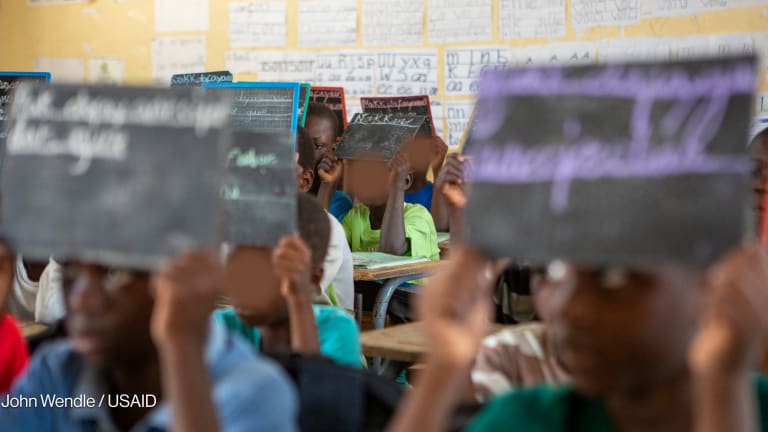
The world needs almost 69 million new teachers by 2030 to achieve universal primary and secondary education — part of the United Nations’ Sustainable Development Goal 4. Currently, hundreds of millions of children and young people are out of school.
In addition, the Brookings Institution calls the prospect of leveraging education to reduce carbon emissions “potentially more powerful than solely increasing investments in onshore wind turbines … or concentrated solar power.” Clearly, the needs and consequences of education are enormous.
Globaldev careers: The monitoring and MIS manager
Papia Ferdousei, senior manager for monitoring and evaluation and management information systems for BRAC’s education program, talks to Devex about the skills that helped her expand her portfolio and oversee a new team within the organization.
What, then, is the fastest way for global education to reach that scale? Crucial insights can be gained from Bangladesh. There, BRAC has operated a network of one-room schools with teachers drawn from communities since 1985. That network has brought education to 14 million students.
The key to educating at that scale in a so-called least-developed country has not been new infrastructure but a new mindset. As director of education at BRAC for 34 years, stepping down from the role in 2021, I know how widespread and limiting that earlier mindset was.
Traditionally, the challenge for scaling education lay in building schools, as well as training and hiring teachers. The assumption was that schools are created specifically for that purpose and teachers are trained in institutions of higher education. This then became not only an expensive proposition but a distant one. Building schools in every community was impossible, and highly trained teachers were scarce — meaning fully staffed schools could not be in every village and students would have to travel to them. That, in turn, undercut the potential of education.
BRAC’s initial research revealed numerous obstacles imposed by this traditional approach. Many children could not arrange to travel the distance to school. Roads were often blocked by flooding or considered dangerous. Children in ethnic minority groups faced additional obstacles, as did those with disabilities. During harvests, children were needed at home. Throughout the year, meanwhile, school interfered with vital chores. Most teachers were men, which made parents uncomfortable sending young girls to school and dramatically reduced attendance.
As a result, 40% of Bangladesh’s primary-school-age children were not in school in the early 1980s. Half of the students who enrolled dropped out, and only 30% went on to complete their primary education. BRAC responded to this research by questioning virtually every assumption.
For example, why did schools have to be specially built? Could temporary solutions not be found? Why did large numbers of students have to go to school in the same building? Why couldn’t every village have a school? Why did teachers have to be men? Why couldn’t respected women be trained to teach specific grades in their communities? Why did children have to go to school during harvests? Why did school have to interfere with chores? And, most importantly, did children have to dread going to school?
The result was a radically different system of education, based upon a new mindset. That new system not only scaled but proved more successful than the earlier method.
What was BRAC’s approach? First, bring the schools to the students. In every village, rent as many one-room schools as needed for up to 30 children to learn together, instead of the traditional 50 to 60 in a classroom. That eliminates the travel problems and the cost of funding and creating buildings. If children live in areas that are often flooded, build boat schools.
The key to educating at that scale in a so-called least-developed country has not been new infrastructure but a new mindset.
—Second, adjust school timing to fit family needs. Close school during harvests and give children free time during the school day to address family needs. It’s better to have children in school for most of the year than not at all.
Third, make school fun. Include activities in which every child performs — drawing, singing, or dancing — every day for at least half an hour. Abolish rote learning. Organize group teaching and pair work so that faster learners can help educate their lower-performing peers. Ensure that individual children get attention and that every school accommodates those with disabilities. It is vital that children like school and want to come every day, and that it is a safe space for every child.
Fourth, provide students with books and school supplies and don’t charge fees. That eliminates poverty as an obstacle to education.
Fifth, train women in the community to teach and give them ongoing support and training. That overcomes parental hesitation, causes girls’ attendance to rise dramatically, and expands the number of educators. These teachers already know their communities and children’s families, making it easier to follow student progress.
This overall approach was implemented for grades one to five, with each teacher in each one-room school working with children through every grade over four years. Students then attend government-run schools for grade six and above. That makes this approach immensely scalable — almost every village in Bangladesh has a school — and generates impressive educational results.
One notable outcome is that BRAC teachers turn up to school. Absentee rates — a challenge in many schools, particularly in remote areas — are less than 5% for BRAC teachers. Almost 100% of students complete fifth grade, and BRAC students consistently perform better than their public school counterparts on government tests.
Old assumptions leave the world with a need for 69 million teachers, millions more children and youths out of school, and climate change growing rapidly. It’s time to reconsider assumptions.








